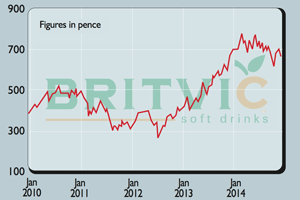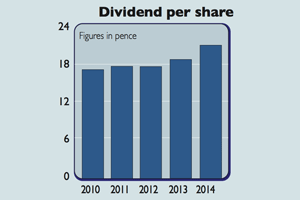Shares in focus: Is Britvic too frothy?
Soft drinks maker Britvic is a good business. But should you buy the shares at the current price? Phil Oakley investigates.
Get the latest financial news, insights and expert analysis from our award-winning MoneyWeek team, to help you understand what really matters when it comes to your finances.
You are now subscribed
Your newsletter sign-up was successful
Want to add more newsletters?

Twice daily
MoneyWeek
Get the latest financial news, insights and expert analysis from our award-winning MoneyWeek team, to help you understand what really matters when it comes to your finances.

Four times a week
Look After My Bills
Sign up to our free money-saving newsletter, filled with the latest news and expert advice to help you find the best tips and deals for managing your bills. Start saving today!
The soft drinks maker is a good business, but the shares are too pricey, says Phil Oakley.
Britvic is Britain's biggest soft drinks company, selling more than two billion litres of still and fizzy soft drinks a year. The company can trace its roots back to the mid-19th century, when a Chelmsford chemist started making home-made soft drinks.
Before it changed its name to Britvic in 1971, the business traded as the British Vitamin Products Company, which used drinks as a way for people to get their vitamins.
MoneyWeek
Subscribe to MoneyWeek today and get your first six magazine issues absolutely FREE

Sign up to Money Morning
Don't miss the latest investment and personal finances news, market analysis, plus money-saving tips with our free twice-daily newsletter
Don't miss the latest investment and personal finances news, market analysis, plus money-saving tips with our free twice-daily newsletter
Today the company owns some of the best-known soft drinks brands in the country, such as Robinsons, Tango, J2O and Fruit Shoot. It also has licences to make and bottle Pepsi and 7UP in the UK and Ireland. In recent years the company has expanded overseas.
It has bought businesses in Ireland and France, which have experienced mixed fortunes. It has also started selling its Fruit Shoot drinks in America and India.
Spurned advances
Since then the company's profits and share price have been trending sharply higher. Yet the business still faces many challenges. Can the good times keep rolling or could Britvic shares be about to lose their fizz?
Britvic's decision to knock back AG Barr's advances looks to have been the right one for now. The company has recently reported a very decent profit performance for the year to September and currently has a market value of £1.7bn the same as Barr and Britvic combined were valued at two years ago. All is well or so it would seem.
However, dig a little further into the company's financial performance and there's definitely cause for concern. Yes, an 18.8% rise in annual earnings per share (EPS) and a 13.6% hike in the dividend is welcome but it's how those numbers were achieved that could be the problem on the horizon.
Sales are the lifeblood of any successful business. Without getting more money into the company's coffers from selling more products, it's difficult to keep on growing profits. Britvic's sales only grew by 1.7% last year. During the second half, sales actually fell by 1.3%.
Sales of Pepsi Max and Fruit Shoot are growing reasonably well, but people are buying less Robinsons Squash and J2O. The market for still soft drinks in the UK has shrunk slightly, with water the only category showing meaningful growth. Unfortunately for Britvic, it doesn't have a big water brand to capitalise on this trend.
Elsewhere, sales in France were held back by the disruption caused from bringing a new production line into service. In Ireland, cash-strapped consumers are keeping their hands in their pockets and looking for value for money. This has pushed selling prices down. In other markets, Britvic has raised prices to offset the damage from selling fewer drinks.
Slashing costs
But what happens to profits when the cost cutting runs out? There's no way around it Britvic needs to get its sales growing again. But this is not going to be easy. Consumers are increasingly avoiding sugar-loaded soft drinks and opting for healthier choices, such as water.
In any case, the lack of wage growth in the UK means there's no guarantee the soft-drink market is capable of growing particularly strongly. There is also the growing threat of supermarket own-label products for items such as squashes. The dire state of Britain's supermarket chains and the resulting price wars between them is also likely to drive down selling prices.
So where is the sales growth going to come from? Well, Britvic is being more active in pushing its low-calorie drinks, which could attract more health-conscious consumers. Fruit Shoot also has a lot of potential.
The brand is growing rapidly in France, while Britvic has also signed a 15-year franchise agreement with PepsiCo to sell it in America. It has also teamed up with a local partner in India.
If sales growth is hard to come by, then it's difficult to see profits growing over the medium term. This might bring AG Barr or another merger partner to the negotiating table and a deal could be done. But with Britvic's valuation a lot richer than it was a couple of years ago, I'm not sure that the financial logic for a merger deal is as compelling as it was a couple of years ago.
Should you buy the shares?
return on capital employed (ROCE)
Britvic shares don't look horrendously expensive but they are not cheap either. The danger is that if in a year's time sales aren't growing, then profits growth may be heading for a brick wall. On that basis, existing shareholders might want to think about selling while the going is still good.
Verdict: take some profits
Britvic (LSE: BVIC)


Directors' shareholdings
Get the latest financial news, insights and expert analysis from our award-winning MoneyWeek team, to help you understand what really matters when it comes to your finances.
Phil spent 13 years as an investment analyst for both stockbroking and fund management companies.
-
 Average UK house price reaches £300,000 for first time, Halifax says
Average UK house price reaches £300,000 for first time, Halifax saysWhile the average house price has topped £300k, regional disparities still remain, Halifax finds.
-
 Barings Emerging Europe trust bounces back from Russia woes
Barings Emerging Europe trust bounces back from Russia woesBarings Emerging Europe trust has added the Middle East and Africa to its mandate, delivering a strong recovery, says Max King